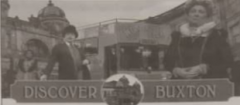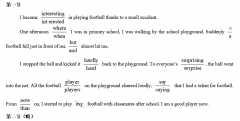2015浙江余姚三模英语试题及答案(4)
Take a nap every afternoon. When you go out into the world, watch for traffic, hold hands, and stick together. Be aware of wonder. Remember the little seed in the plastic cup. The roots go down and the plant goes up and nobody really knows how or why, but we are all like that.
Goldfish and hamsters(仓鼠) and white mice and even the little seed in the plastic cup—they all die. So do we.
And then remember the book about Dick and Jane and the first word you learned, the biggest word of all: Look. Everything you need to know is in there somewhere. The Golden Rule and love and basic sanitation, ecology and politics and sane living.
Think of what a better world it would be if we all the whole world had cookies and milk about 3 o’clock every afternoon and then lay down with our blankets for a nap, or if we had a basic policy in our nations to always put things back where we found them and cleaned up our own messes. And it is still true, no matter how old you are, when you go out into the world, it is better to hold hands and stick together.51. What can kids learn in kindergarten?
A. Apologize to the person who is hurt by you.
B. Share toys with your friends.
C. Balance your study, work and play.
D. Communicate with your friends effectively.
A. abc B. abd C. bcd D. abcd
52. What is the writer’s purpose in writing the underlined sentences?
A. To tell the kids that the little animals and the little seed all have a short life.
B. To call up the kids to protect the animals and plants.
C. To make the kids realize that life is short and we have to cherish our life.
D. To recommend kids to raise some animals in their spare time.
53. Which of the following can NOT be concluded from the passage?
A. Adults as we are, we are supposed to help and support each other when necessary.
B. What we learnt in kindergarten has a great effect on our future lives.
C. Kindergarten is the most important period in our lives.
D. I learned in kindergarten all I ever needed to know.
54. How is the text organized?
A. Topic—Argument—Explanation
B. Opinion—Discussion—Description
C. Main idea—Comparison—Supporting examples
D. Introduction—Supporting examples—Conclusion
D
Having worked at a 7-Eleven store for two years, I thought I had become successful at what our manager calls “customer relations”. I firmly believed that a friendly smile and an automatic “sir”, “ma’am”, and “thank you” would see me through any situation that might arise, from soothing(安慰,劝慰)impatient or unpleasant people to apologizing for giving out the wrong change. But the other night an old woman shattered my belief that a glib(非诚恳的)response could smooth over the rough spots of dealing with other human beings.
The moment she entered, the woman presented a sharp contrast to our shiny store with its bright lighting and neatly arranged shelves. Walking as if each step were painful, she slowly pushed open the glass door. She coughed dryly, breathing noisily with each breath. On a forty-degree night, she was wearing only a faded print dress, a thin sweater too small to button, and black slippers with the backs cut out to expose heels. There were no stockings or socks on her blue-veined legs.
After strolling around the store for several minutes, the old woman stopped in front of the rows of canned vegetables. She picked up some corn niblets and stared with a strange intensity at the label. At that point, I decided to be a good employee and asked her if she needed help. As I stood close to her, my smile became harder to maintain; her red-rimmed eyes were partially closed by yellowish crusts; her hands were covered with layer upon layer of dirt, and the unpleasant smell of sweat rose in a thick vaporous cloud from her clothes.
“I need some food,” she muttered(嘟囔)in reply to my bright “Can I help you?”
“Are you looking for corn, ma’am?”
“I need some food,” she repeated. “Any kind.”
“Well, the corn is ninety-five cents,” I said in my most helpful voice. “Or, if you like, we have a special on bologna(大红肠)today.”
“I can’t pay,” she said.
For a second, I was tempted to say, “Take the corn.” But the employee rules flooded into my mind: Remain polite, but do not let customers get the best of you. Let them know that you are in control. For a moment, I even entertained the idea that this was some sort of test, and that this woman was someone from the head office, testing my loyalty. I responded dutifully, “ I’m sorry, ma’am, but I can’t give away anything for free.”
The old woman’s face collapsed a bit more, if that were possible, and her hands trembled as she put the can back on the shelf. She shuffled(蹒跚)past me toward the door, her torn and dirty clothing barely covering her bent back.
Moments after she left, I rushed out the door with the can of corn, but she was nowhere in sight. For the rest of my shift, the image of the woman kept coming to my mind. I had been young, healthy. She had been old, sick and desperate. Wishing with all my heart that I had acted like a human being rather than a robot, I was saddened to realize how fragile a hold we have on our better instincts(本能,天性).
55. What does the underlined world “shatter” in Paragraph 1 probably mean?
A. Maintain. B. Break. C. Hold. D. Lose.
56. Which is NOT mentioned in Paragraph 2?
A. The old lady’s clothes. B. The environment of the store.





